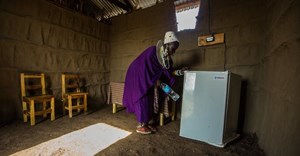Trending
Elections 2024
Jobs
- Parts Picker and Packer - Trucks East Rand
- Motor Vehicle Technician Johannesburg South
- 12-Month Automotive Learnership Opportunity Pinetown
- Parts Picker and Packer Cape Town
- Sales Executive Johannesburg
- Vehicle Technician Umhlanga
- Service Advisor Pretoria East
- Vehicle Technician Stellenbosch
- New Vehicle Sales Executive Johannesburg North
- Parts Manager Johannesburg North
How will the Carbon Tax affect mobility in South Africa?
I spent the past holidays at my rural village in the Eastern Cape, South Africa and saw first-hand how much climate change is impacting our local communities from food production to transportation and overall survival. This was probably the driest Christmas I have ever experienced at home since I was a child.

Even though the people that live in my village have done little to contribute towards these rising climate challenges they will be the first ones to be impacted by them. However, the biggest observation has been how people move between the various cities and towns in response to these new realities of persistent drought and extreme weather patterns.
As a wake-up call to these new realities, the South African government is introducing new legislation in response to the rapid climate risks heightened by the large emitters of greenhouse gases (GHGs) — the Carbon Tax becomes effective on the 1 June 2019. This is also a follow up in response to a commitment that was made by the country in 2016 as part of the global agreement on climate change that was decided in Paris in December of that year.
The imminent Carbon Tax Act, which will apply over and above the corporate income tax, will impose a carbon tax on entities, which in their operations, emit GHGs above the permissible threshold to be set by the Act.
The good news is that the Carbon Tax will be introduced in South Africa at a time when some positive strides are made towards a low carbon economy by the early adopters who are now fully entrenched in their green business journeys.
Cities around the world, especially in Europe, have begun to shun internal combustion engines (ICEs) in favour of boosting air quality for their residents. It anticipated that South Africa will follow in this low carbon pathway as stipulated in South Africa’s Green Transport Strategy that was launched in November 2018.
While some of us still enjoy the simple pleasures of walkable and cyclable cities, greener mobility technologies are increasingly playing a vital role in improving people’s movement across cities and towns while also contributing towards South Africa’s GDP.

Electric vehicles (EVs) and hybrids are expected to be an integral part of the future of transport and energy in the green built environment — specifically with the deployment of charging stations in residential, commercial and retail developments — which may offer vehicle-to-grid (V2G) virtual storage for renewable energy. Today, electric vehicle batteries store incredible amounts of energy that can be discharged quickly, safely, and smoothly - giving EVs instant acceleration, responsive handling, and fast recharging times.
The rising demand for batteries for EVs is also driving their price down and this promises to result in a market for repurposed EV batteries for use in the storage of solar energy in buildings.
A growing trend is the increasing consumer awareness towards the negative effects of pollution that is caused by traditional transportation system such as internal combustion engines (ICEs).
What implication does this trend have for the automotive industry?
For starters, it has awakened this industry to the growing consumer needs and wants for cleaner and greener transport. A recent study by Deloitte has highlighted that the majority (55%) of SA consumers are still looking to traditional Original Equipment Manufacturers (OEMs) for answers to improve the air quality for city residents. Major OEMs are joining the green revolution and South Africa is getting ready to embrace this revolution.
There are quite a few EVs already on South African roads including BMW i3, Nissan Leaf, Jaguar I-Pace, Audi e-tron. Current charging infrastructure is growing, though charging stations remain few and far between, and mostly situated in large cities. However, more EVs on the roads should stimulate demand for charging stations as well.
On the other side, EVs remain somewhat costly for ordinary SA consumers. The bright side for consumers is that EVs and hybrid cars present a viable alternative against the rising cost of fuel and growing aversion to petrol and diesel engines. In fact, OEMs such as Toyota are already entrenched in the hybrid market already has the largest market share globally, with the hybrids currently more popular in the US, Europe and Asian markets. An increasing number of EU countries shun polluting cars, which means that SA OEMs will need to start manufacturing zero-emission vehicles since the EU (and more specifically Germany) is SA’s biggest export market.
OEMs have a responsibility to operate with greater energy and water efficiency, supported by gradual phasing in of small-scale renewable energy in their areas of operation and water efficiency through the effective use of water tanks in office buildings and assembly plants, etc. While this has a capital cost for OEMs, there are energy efficiency incentives, for example, the section 12L energy efficiency tax incentive in and the Energy Efficiency and Demand Side Management (EEDSM) program. Also, the introduction of such efficiency measures would mean decreasing utility costs and a healthier bottom line for OEMs – so, a win-win scenario for OEMs!
Green Cafés in Support of Green Mobility
The Green Building Design Group (GreenBDG) team* is scheduled to host Green Cafés that will have sustainability experts, industry specialists and public sector representatives to design sustainable green mobility solutions.
Why mobility? Well, mobility connects us all to - our places of work, to the food we consume and for most of us our families in distant locations.














